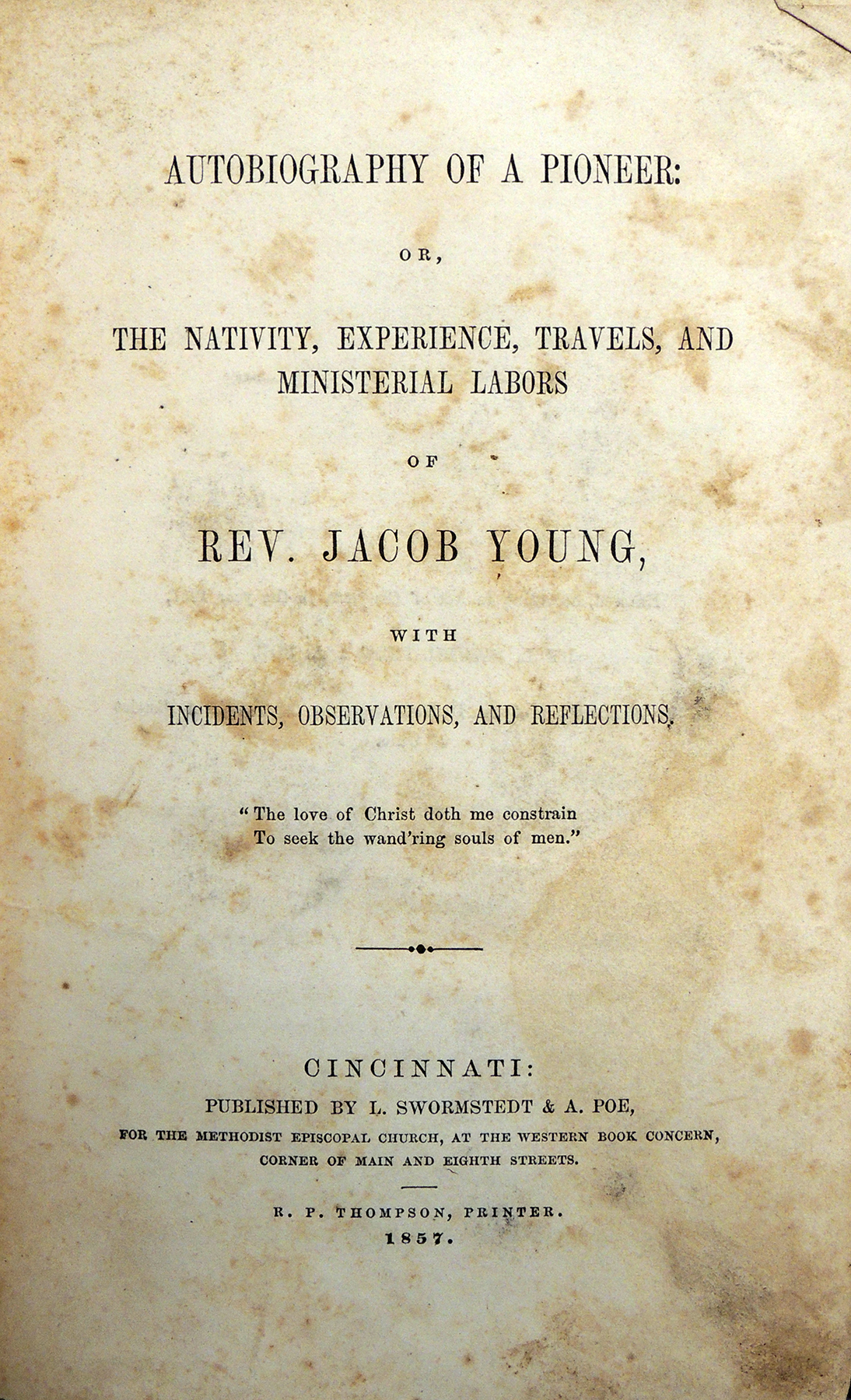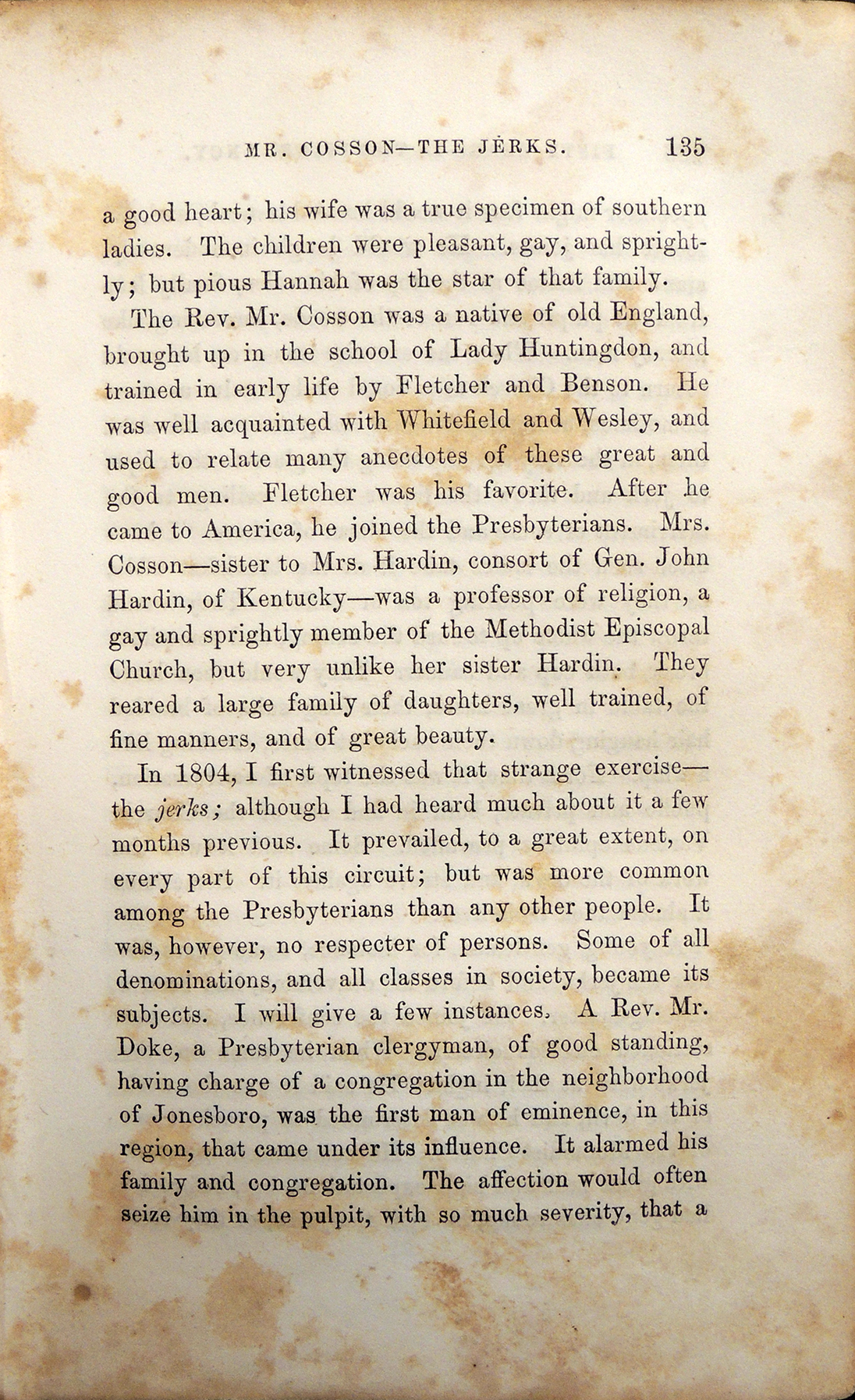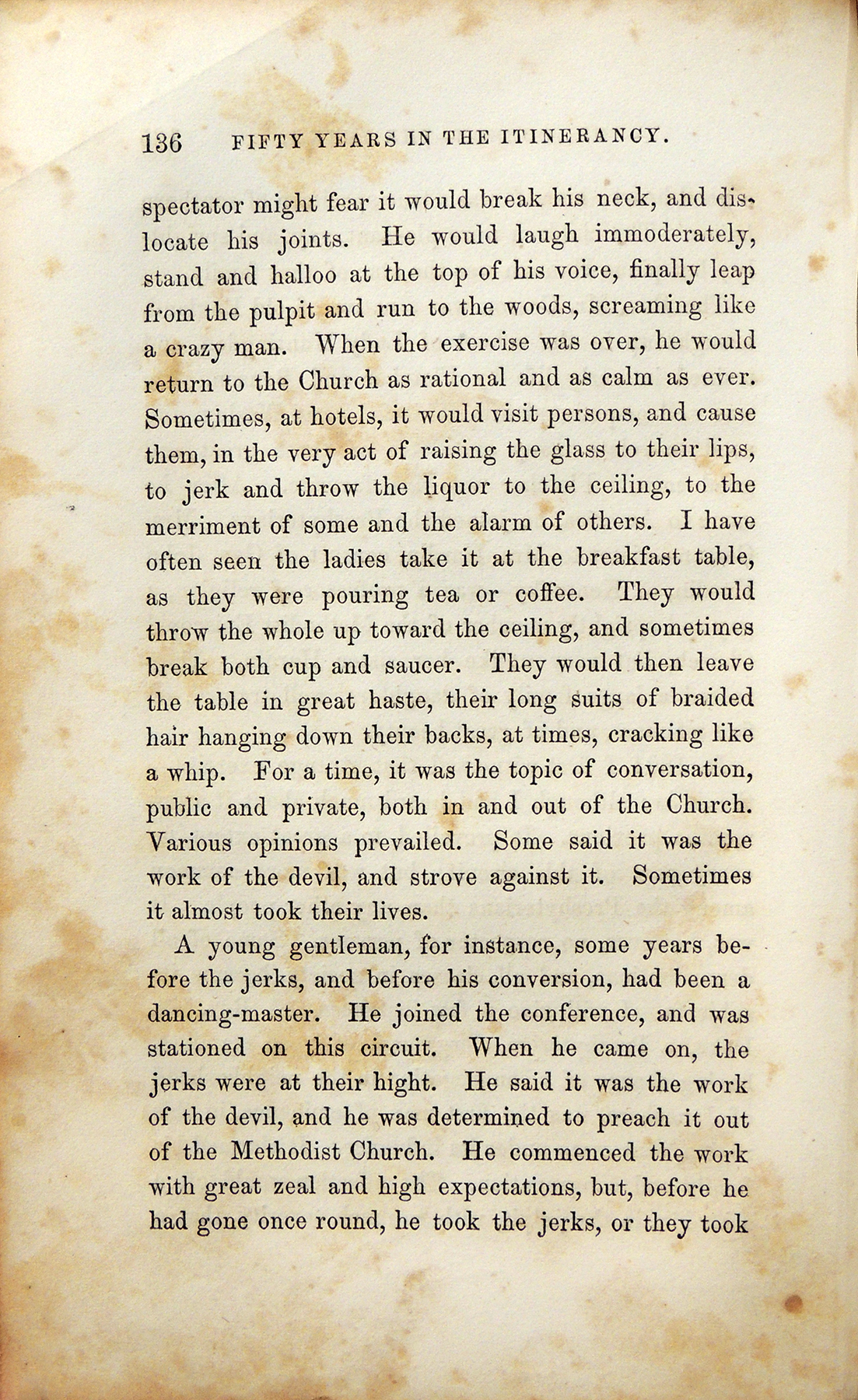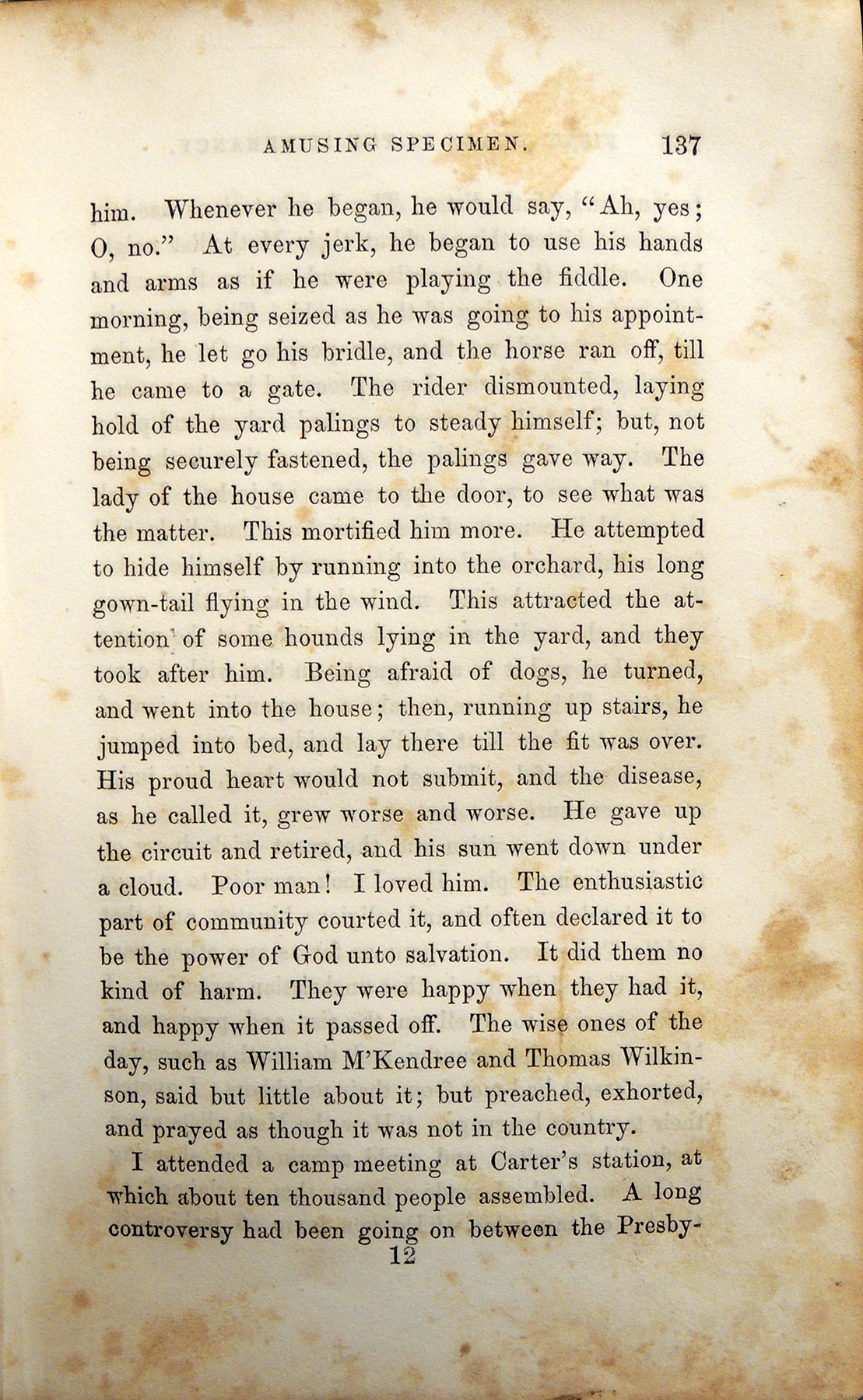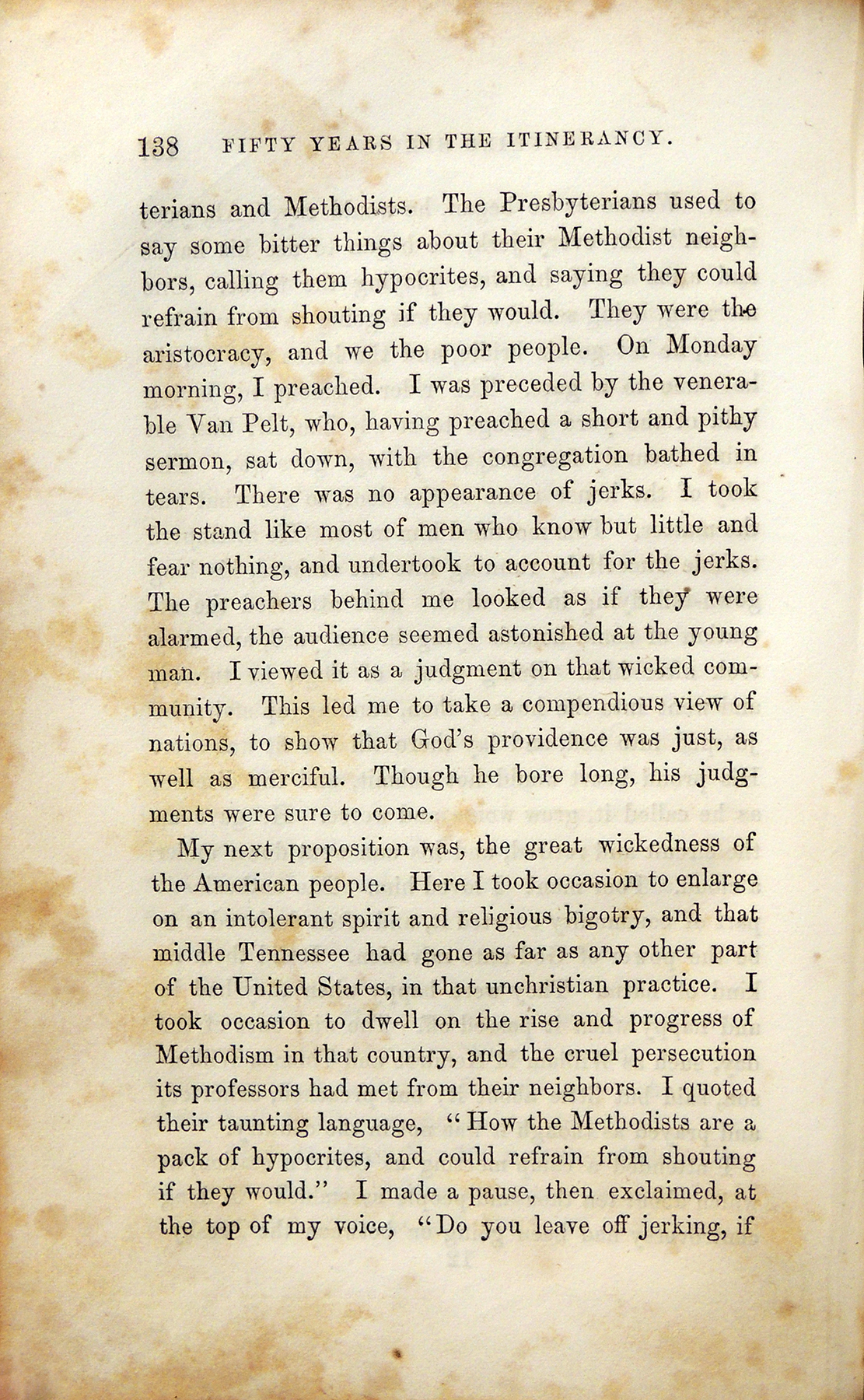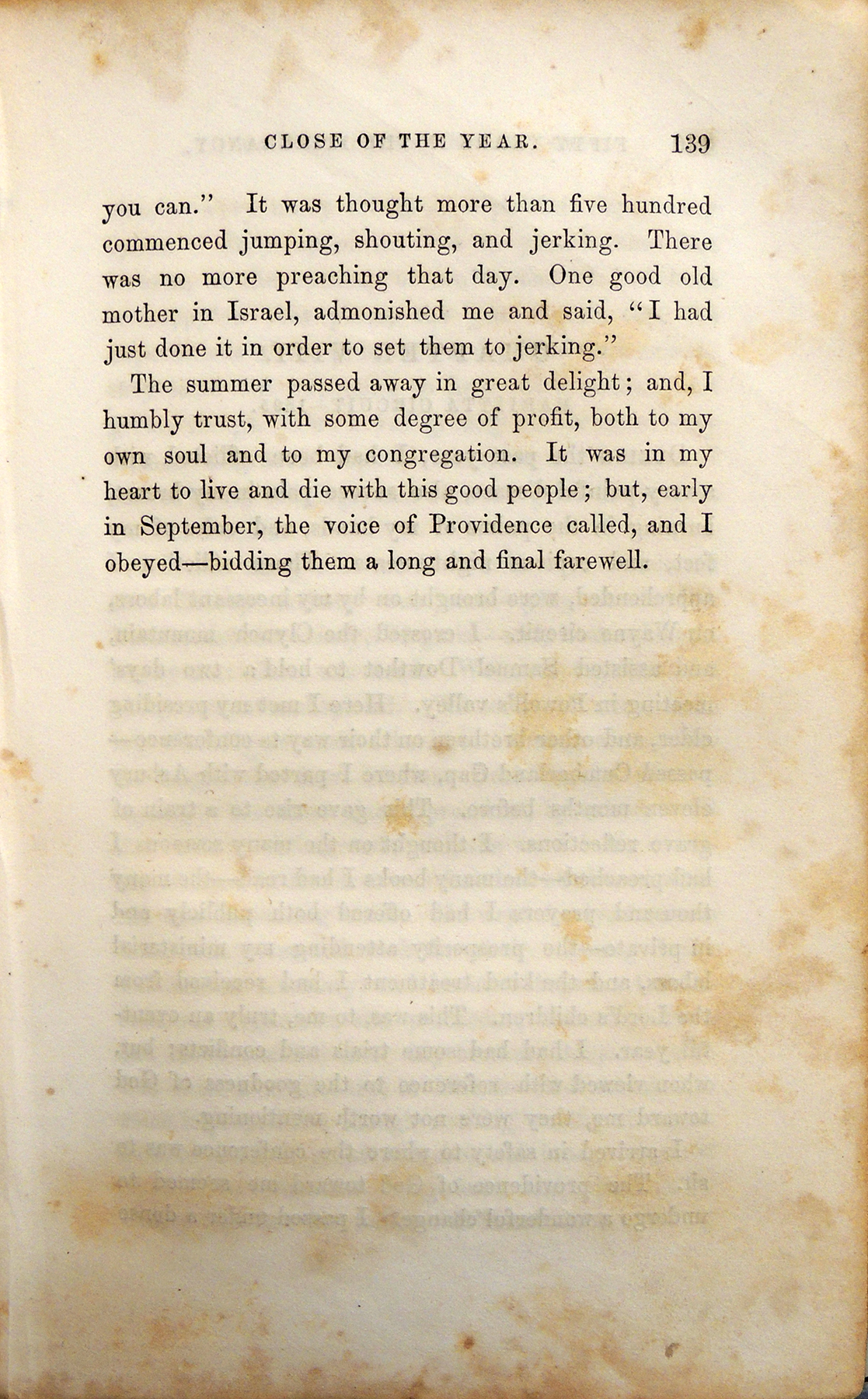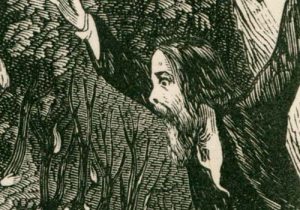Circuit rider Jacob Young described one of the largest known outbreaks of the jerking exercise during a camp meeting held at Carter’s Station (now Albany), Tennessee, in August 1804. Nearly five hundred of the estimated ten thousand participants fell into fits of “jumping, shouting, and jerking” during Young’s powerful sermon performance. Unlike most of his Methodist colleagues, Young approved of the jerks, and he appears to have intentionally provoked somatic responses among his audiences. Young’s lively autobiography also provides evidence that Samuel Doak, the venerable Presbyterian minister and founder of Tusculum University, ranked among the most prominent jerkers in the region. Click here for the full text of Young’s Autobiography of a Pioneer (1858).
In 1804, I first witnessed that strange exercise the jerks; although I had heard much about it a few months previous. It prevailed, to a great extent, on every part of this circuit; but was more common among the Presbyterians than any other people. It was, however, no respecter of persons. Some of all denominations, and all classes in society, became its subjects. I will give a few instances. A Rev. Mr. Doke, a Presbyterian clergyman, of good standing, having charge of a congregation in the neighborhood of Jonesboro, was the first man of eminence, in this region, that came under its influence. It alarmed his family and congregation. The affection would often seize him in the pulpit, with so much severity, that a spectator might fear it would break his neck, and dislocate his joints. He would laugh immoderately, stand and halloo at the top of his voice, finally leap from the pulpit and run to the woods, screaming like a crazy man. When the exercise was over, he would return to the Church as rational and as calm as ever. Sometimes, at hotels, it would visit persons, and cause them, in the very act of raising the glass to their lips, to jerk and throw the liquor to the ceiling, to the merriment of some and the alarm of others. I have often seen the ladies take it at the breakfast table, as they were pouring tea or coffee. They would throw the whole up toward the ceiling, and sometimes break both cup and saucer. They would then leave the table in great haste, their long suits of braided hair hanging down their backs, at times, cracking like a whip. For a time, it was the topic of conversation, public and private, both in and out of the Church. Various opinions prevailed. Some said it was the work of the devil, and strove against it. Sometimes it almost took their lives.
A young gentleman, for instance, some years before the jerks, and before his conversion, had been a dancing-master. He joined the conference, and was stationed on this circuit. When he came on, the jerks were at their hight. He said it was the work of the devil, and he was determined to preach it out of the Methodist Church. He commenced the work with great zeal and high expectations, but, before he had gone once round, he took the jerks, or they took him. Whenever he began, he would say, “Ah, yes; O, no.” At every jerk, he began to use his hands and arms as if he were playing the fiddle. One morning, being seized as he was going to his appointment, he let go his bridle, and the horse ran off, till he came to a gate. The rider dismounted, laying hold of the yard palings to steady himself; but, not being securely fastened, the palings gave way. The lady of the house came to the door, to see what was the matter. This mortified him more. He attempted to hide himself by running into the orchard, his long gown-tail flying in the wind. This attracted the attention of some hounds lying in the yard, and they took after him. Being afraid of dogs, he turned, and went into the house; then, running up stairs, he jumped into bed, and lay there till the fit was over. His proud heart would not submit, and the disease, as he called it, grew worse and worse. He gave up the circuit and retired, and his sun went down under a cloud. Poor man! I loved him. The enthusiastic part of community courted it, and often declared it to be the power of God unto salvation. It did them no kind of harm. They were happy when they had it, and happy when it passed off. The wise ones of the day, such as William M’Kendree and Thomas Wilkinson, said but little about it; but preached, exhorted, and prayed as though it was not in the country.
I attended a camp meeting at Carter’s station, at which about ten thousand people assembled. A long controversy had been going on between the Presbyterians and Methodists. The Presbyterians used to say some bitter things about their Methodist neighbors, calling them hypocrites, and saying they could refrain from shouting if they would. They were the aristocracy, and we the poor people. On Monday morning, I preached. I was preceded by the venerable Van Pelt, who, having preached a short and pithy sermon, sat down, with the congregation bathed in tears. There was no appearance of jerks. I took the stand like most of men who know but little and fear nothing, and undertook to account for the jerks. The preachers behind me looked as if they were alarmed, the audience seemed astonished at the young man. I viewed it as a judgment on that wicked community. This led me to take a compendious view of nations, to show that God’s providence was just, as well as merciful. Though he bore long, his judgments were sure to come.
My next proposition was, the great wickedness of the American people. Here I took occasion to enlarge on an intolerant spirit and religious bigotry, and that middle Tennessee had gone as far as any other part of the United States, in that unchristian practice. I took occasion to dwell on the rise and progress of Methodism in that country, and the cruel persecution its professors had met from their neighbors. I quoted their taunting language, “How the Methodists are a pack of hypocrites, and could refrain from shouting if they would.” I made a pause, then exclaimed, at the top of my voice, “Do you leave off jerking, if you can.” It was thought more than five hundred commenced jumping, shouting, and jerking. There was no more preaching that day. One good old mother in Israel, admonished me and said, “I had just done it in order to set them to jerking.”
Source
Autobiography of a Pioneer: Or, the Nativity, Experience, Travels, and Ministerial Labors of Rev. Jacob Young, with Incidents, Observations, and Reflections (Cincinnati: Poe and Hitchcock, 1858), 135–139.
Images courtesy of the American Antiquarian Society, Worcester, Massachusetts.
